Rob Bell's Blog, page 14
November 23, 2018
Most Sport Parents Make This Mistake and It’s Dangerous


Sport Parents Make This Mistake And It’s Dangerous.
This is not a click-bait title, this post is about stopping this mistake that can literally save your young athlete! But, sport parents make this mistake all of the time.
Albert Jennings was one of the top youth golfers in the entire nation before his 15th birthday. He won 90% of the tournaments he entered between ages 10-15 years old. He not only practiced and played golfer every single day and played in a tournament every three days, but he always wore pants when he golfed. As a kid, he wore pants because was going to be on the PGA Tour.
PGA Tour player and 3x All-American Patrick Rodgers, once asked him “How could [he] get to Albert’s level?”
So, what happens to the prodigy and wunderkind when they start to struggle? It’s the same thing that happens to all good athletes, it depends on the parents.
As parents, what is the precedent that we set after unsuccessful outcomes and poor results?
A precedent is a rule or principle that serves as a guide for future decisions. I never thought it was applicable outside of the law and especially to sport parents. Oh my, how I was wrong.
Read 10 Reminders if You’re A Stressed Out Parent of An Athlete
Sport Parents make this mistake of setting a poor precedent after every important game.
Do we as parents start drilling them on the way home?
Is our role to point out everything they did incorrectly and how they can “get better?”
Is comparing them to others a common theme for us?
Is the precedent we set immediately calling their coach?
Do we hit up another practice session right away?
Do we yell or pile on about how they aren’t “trying?”
On a long enough timeline, when do we as parents start to internally panic after enough mediocre results and feel helpless to just fix it for them?
How parents behave and communicate after an event is the precedent that is set. Sport parents make this mistake by setting bad examples.
When Albert Jennings started to struggle and not meet the super high expectations, the precedent took over, which was “what’s the matter with the swing?” Something is WRONG and we must FIX it! After every single unsuccessful event, it became what’s the matter?
Listen to my guest episode on Parenting Peak Performers Podcast.
Focusing only on the problem and trying to figure it out for them begins a vicious negative cycle. What happens is that The athlete starts to search instead of practice. Very quickly the bottom can drop out because they get away from sound fundamentals. Their confidence which is already fragile now becomes an issue and once athletes lose confidence, it’s difficult to get it back.
Athlete’s that had success early, yet later on struggle, face a difficult path.
They often start to question their own athletic identity of “I win.” More importance is then placed upon results and outcome to regain their identity of “this is who I am.”! Now, they feel like they are on an island by themselves and if they are unlucky enough to be told “it’s all in your head,” then they are shot into the abyss.
If we stare at the abyss long enough, the abyss stares back at us!
If we stare at the abyss long enough, the abyss stares back at us!
Click To Tweet
When we set a poor precedent as parents, we are inserting ourselves into the mix of how to fix what went wrong and soon, the young athlete looks for you to solve it for them!
We do not build capacity that way, all it does is build dependency.
We don’t know what we don’t know, but sadly sport parents make this mistake of setting the wrong precedent and it can be one of the most detrimental actions toward development.
We all want the best for our own kids, but isn’t it odd that we are the hardest on those who we love the most? We are hardest on them because we also have the highest of expectations for them.
Parents, we NEED to develop a healthy relationship with winning & losing. Setting the correct precedent means simply operating the same after good and bad outcomes! We need to have a game plan before events and think about balance and perspective and keeping the sport pure.
I interviewed Albert and gained so much wisdom from him. His insight is incredible and just know that he’ll be an awesome golf coach!
Dr. Rob Bell is a Sport Psychology Coach. His company DRB & Associates is based in Indianapolis. Some clients have included: Indy Eleven, University of Notre Dame, Marriott, and Walgreens. Check out all the books.
Please check out the podcast 15 Minutes of Mental Toughness as we interview expert athletes and coaches about Mental Strength and their Hinge Moment.
Most Sport Parents Make This Dangerous Mistake


Sport Parents Make This Mistake And It’s Dangerous.
This is not a click-bait title, this post is about stopping this mistake that can literally save your young athlete! But, parents make this mistake all of the time.
Albert Jennings was one of the top youth golfers in the entire nation before his 15th birthday. He won 90% of the tournaments he entered between ages 10-15 years old. He not only practiced and played golfer every single day and played in a tournament every three days, but he always wore pants when he golfed. As a kid, he wore pants because was going to be on the PGA Tour.
PGA Tour player and 3x All-American Patrick Rodgers, once asked him “How could [he] get to Albert’s level?”
So, what happens to the prodigy and wunderkind when they start to struggle? It’s the same thing that happens to all good athletes, it depends on the parents.
As parents, what is the precedent that we set after unsuccessful outcomes and poor results?
A precedent is a rule or principle that serves as a guide for future decisions. I never thought it was applicable outside of the law and especially to sport parents. Oh my, how I was wrong.
Parents make this mistake of setting a poor precedent after every important game.
Do we as parents start drilling them on the way home?
Is our role to point out everything they did incorrectly and how they can “get better?”
Is comparing them to others a common theme for us?
Is the precedent we set immediately calling their coach?
Do we hit up another practice session right away?
Do we yell or pile on about how they aren’t “trying?”
On a long enough timeline, when do we as parents start to internally panic after enough mediocre results and feel helpless to just fix it for them?
How parents behave and communicate after an event is the precedent that is set. Parents make this mistake by setting bad examples.
When Albert Jennings started to struggle and not meet the super high expectations, the precedent took over, which was “what’s the matter with the swing?” Something is WRONG and we must FIX it! After every single unsuccessful event, it became what’s the matter?
Listen to my guest episode on Parenting Peak Performers Podcast.
Focusing only on the problem and trying to figure it out for them begins a vicious negative cycle. What happens is that The athlete starts to search instead of practice. Very quickly the bottom can drop out because they get away from sound fundamentals. Their confidence which is already fragile now becomes an issue and once athletes lose confidence, it’s difficult to get it back.
Athlete’s that had success early, yet later on struggle, face a difficult path. They often start to question their own athletic identity of “I win.” More importance is then placed upon results and outcome to regain their identity of “this is who I am.”! Now, they feel like they are on an island by themselves and if they are unlucky enough to be told “it’s all in your head,” then they are shot into the abyss.
If we stare at the abyss long enough, the abyss stares back at us!
If we stare at the abyss long enough, the abyss stares back at us!
Click To Tweet
When we set a poor precedent as parents, we are inserting ourselves into the mix of how to fix what went wrong and soon, the young athlete looks for you to solve it for them! We do not build capacity that way, all it does is build dependency. We don’t know what we don’t know, but sadly parents make this mistake of setting the wrong precedent and it can be one of the most detrimental actions toward development.
We all want the best for our own kids, but isn’t it odd that we are the hardest on those who we love the most? We are hardest on them because we also have the highest of expectations for them.
Parents, we NEED to develop a healthy relationship with winning & losing. Setting the correct precedent means simply operating the same after good and bad outcomes! We need to have a game plan before events and think about balance and perspective and keeping the sport pure.
I interviewed Albert and gained so much wisdom from him. His insight is incredible and just know that he’ll be an awesome golf coach!
Dr. Rob Bell is a Sport Psychology Coach. His company DRB & Associates is based in Indianapolis. Some clients have included: Indy Eleven, University of Notre Dame, Marriott, and Walgreens. Check out all the books.
Please check out the podcast 15 Minutes of Mental Toughness as we interview expert athletes and coaches about Mental Strength and their Hinge Moment.
November 14, 2018
5 Ways to “Shut-Off” Your Mind Before Bedtime


5 Ways to “Shut-Off” Your Mind Before Bedtime
Multiple techniques have been introduced already for a person to sleep faster. Among these options, shutting off the brain is deemed to be the most effective. Once your mind is relaxed, have a sound evening rest would be a lot easier.
However, here’s the catch: trying to shut-off your mind before bedtime is TOUGH! Our brain is designed to think and to process ideas. It is entirely reasonable, but during bedtime, it is a harrowing experience. Some thoughts are gnawing and can turn into worries.
Again, it is true that you can’t easily shut off your brain. Despite this, you can still elevate all the essential requirements for your mind and body to get relaxed.
Here’s are 5 ways to shut-off your mind before bedtime.
Shut Down Your Devices
It is true that you can’t switch-off your mental faculties. However, you can always help your mind and eyes relax by shutting down the gadgets that surround you. The radiation alone that is coming from these things can distract and stress your eyes.
While it is true that people are not prohibited to install entertainment systems on their bedrooms, it is still recommended that you won’t use them during or before your sleeping time. The things that you watch can play into your head, causing your mind to be active when it shouldn’t be.
Take a Warm Bath
There’s nothing wrong if you want to spoil yourself before bedtime. Before you go to sleep, it would be a nice thing if you could take a warm bath or shower. This kind of pleasure can also help in soothing your mind–allowing you to sleep faster.
Raising the temperature of your body will cause your body to feel sedated. It ensures that your entire system is relaxed and your mind, satisfied. Of course, when you have a relaxed mind, sleeping would never be a problem on your part.
You can also include some additives in your bath. Why not include scented herbs and lotions in the equation? They can double the sedating effect that your body can feel.
Get a Nice Bedroom
Honestly, it is pretty difficult to rest on a place where there is a lot of clutter and mess. Before you can find peace, make sure that your environment is conducive enough to support your goal.
Cleaning your bedroom is already a good start. Just clean all the rubbish that you see. Take out any heap of garbage that is sprawling round. Eliminate all items that cause distractions and uneasiness to you.
Of course, you have to fix your bed, too. Find an ergonomic mattress that can make you feel comfortable and relaxed. You also need to get a set of soft pillows to optimize the relaxation that your mind and body can handle.
Try Yoga
Yoga is an activity that elevates your mental control, concentration, and calm. It is not just a routine where you have to twist your body on some weird and extreme angles. In fact, even those who aren’t skinny enough can do the acrobatics in yoga.
Yoga is said to be an exercise that connects the body, mind, and spirit. This is the very reason why the regimen in yoga is not as extensive as those you can see in the gym. Instead, what yoga develops is discipline so that people can learn proper meditation to achieve a relaxed state.
Furthermore, it has been said that yoga also improves the quality of your evening rest. For instance, to stop snoring, some yoga routines should be executed.
Play Relaxing Sounds
Not all noises are distracting. Some of them can cause your mind to feel calm. For sleeping, it is best if you can play natural sounds–such of those that replicate that ocean, wind, or rain. Our brain accepts them as sedatives, so they are really useful for those whose minds are too baffled for sleep.
You can play these noises on a repeated loop until such time you fall asleep. Make it as a low noise or something that would serve as an audio background to your bedroom.
Wrapping it Up
You don’t need to have a “dead mind” so that you can sleep fast and comfortably. Instead, what you need is a brain that is entirely calm and soothed. It is the one that you need so that you can sleep peacefully during the night.
These techniques that have been introduced in this article are among the most efficient methods for relaxing and strengthening your mind. Please try them and see which ones work best for you.
 Layla Parker is the founder and chief editor of ASleepyWolf.com. I decided to start taking my blog about sleep seriously to help people find what they need to experience better sleep and maintain their health.
Layla Parker is the founder and chief editor of ASleepyWolf.com. I decided to start taking my blog about sleep seriously to help people find what they need to experience better sleep and maintain their health.
Sources:
https://psychcentral.com/lib/12-ways-to-shut-off-your-brain-before-bedtime/
https://www.sleepfoundation.org/relaxation-exercises-falling-asleep-0
https://www.verywellhealth.com/how-to-reduce-racing-thoughts-at-night-3015286
>
November 7, 2018
Top 10 David Novak oGoLead Best Leadership Podcast Episodes


Top 10 David Novak oGoLeadtm Best Leadership Podcast Episodes
I was introduced to this podcast by one of my golfers on Tour. I immediately started listening to every single episode. It took me several months, but here are the filet mignon of episodes. David does an excellent job of allowing every guest to share their experience and his demeanor is evident why he was such a significant leader himself.
CALLAWAY GOLF, SVP MARKETING, HARRY ARNETT | EPISODE #12
I’m a big fan of Harry Arnett having met him at the PGA Show, so I’m biased! Callaway is an excellent brand of innovation and consistency in the role of professional golf. (i.e. Callaway live show). “Innovate or Die” was an incredible lesson learned that Harry discusses in this episode. It was a failure that taught a big lesson. That experience in part allowed his own staff a space to evaluate and judge different ideas.
JOHN “SPIDER” MILLER, CAPTAIN, U.S.A. WALKER CUP TEAM | #21
Spider Miller is a golfer who won the US Mid-Am in 1996 & 1998. Winning was a hinge moment that allowed him to play in The Masters with Arnold Palmer where they developed a deep relationship. From Indiana, the stories about Spider are legendary. He was also the 2x Walker Cup captain and captain of the “winning 2017 Walker Cup team.” It’s an excellent episode on his business acumen as well!
PETE BEVACQUA, CEO, PGA OF AMERICA | OGOLEAD BEST LEADERSHIP PODCAST EPISODES #044
Hmmm, another golf episode, do you see a coincidental theme for the top leadership podcast episodes? I listened to this episode while on the bike trainer for my Ironman. His story about his first days as CEO was quite the experience. He shares how he was able to bring the U.S. Open to Shinnecock Hills Golf Club by making the Shinnecock nation part of that process. It’s an excellent lesson in leadership because there was major strife between the factions.
DONNA BARTON BROTHERS: LEADERSHIP, HORSE RACING & THE TRIPLE CROWN | #039
From a family of jockeys, she rode her first race at age 21 to actually eliminate horse racing as a career. Her perspective on winning and success was simple- “Do you want to win races as a jockey? Ride for people who win races.” The story about her broadcast career and especially interviewing Calvin Borel after winning the derby was very moving. Her message is “you have to find your niche’ in life!” She is inspiring!
THE HOME DEPOT, CO-FOUNDER, KEN LANGONE | EPISODE #6
Ken Langone has a fantastic story! He is a collection of many people and is NOT a self-made individual. He epitomizes the notion that NO ONE Gets There ALONE.
He is always learning and still working! His leadership style is represented by Home Depot that has 3,000 people working WITH them (not for them) who started pushing carts and now are multi-millionaires. It’s great hearing about how the only mistakes he regrets are the mistakes in judgment.
ED STACK, CHAIRMAN & CEO, DICK’S SPORTING GOODS | #038
An excellent story about how he bought out his father from the business at a young age. His quote and theme for life are top-notch- “You can’t B.S. the person in the mirror.” It is interesting that one of the best leadership podcast episodes addresses their Youth Sports Initiative and Sports Matter Foundation. After the parkland High-school shooting, Dick’s also took the courageous lead by announcing that they would stop selling assault firearms and to anyone under 21 years old.
TOM BRADY, NEW ENGLAND PATRIOTS QUARTERBACK | PART 1, #047
This is a 2-part series. Tom Brady was a 6th rd, 299th overall pick. He epitomized capturing a Hinge moment! He is one of the best, if not the best quarterbacks in the game and what he has overcome is remarkable! His experience as a leader is undeniable, especially his take on confidence and emotion! “The NFL season is like climbing a mountain, everyone starts the same and the climb is long and arduous, but worth the summit.”
RORY MCILROY: STAYING HUNGRY & INSPIRATIONAL LEADERSHIP | PART 2, #033
It’s tough not to root for Rory after listening to this podcast. He’s won four majors but is driven as ever and he delves into his “why.” He discusses his growth as a player and how his team has developed across the years. He addresses overcoming injuries in his career and speaking his mind and being authentic. Gratitude is a cornerstone as well that he feels is a huge part of life! This is one of the best leadership podcast episodes!
SANDLER O’NEILL + PARTNERS, SENIOR MANAGING PRINCIPAL, JIMMY DUNNE | EPISODE #16
Since I’ve worked with the University of Notre Dame Athletics, the impact of Jimmy Dunne is evident with the sports programs. One hinge moment came as he was rejected to every law school he applied. However, a player who he used to caddy for, instead directed him to Wall Street. He cites “playing like your behind” as the key to success. After 9/11, it was a difficult situation, so he took specific financial steps to help the firm establish an esprit de corps. One of my favorite parts of the podcast is when he refers to what he looks for in employees: refined desperation!
GARY KELLY, CHAIRMAN AND CEO OF SOUTHWEST AIRLINES | #045
Southwest Airlines had over one hundred and thirty million customer boarding’s last year. Again, I’m biased because I love Southwest airlines. What most impressed me about this interview is that Southwest Airlines has NEVER laid off or furloughed employees or cut pay. Their mission is to treat every customer like guests in their own home!
Dr. Rob Bell is a Sport Psychology Coach. His company DRB & Associates is based in Indianapolis. Some clients have included: Indy Eleven, University of Notre Dame, Marriott, and Walgreens. Check out all the books.
Please check out the podcast 15 Minutes of Mental Toughness as we interview expert athletes and coaches about Mental Strength and their Hinge Moment.
October 12, 2018
How to Win When Life is Unfair
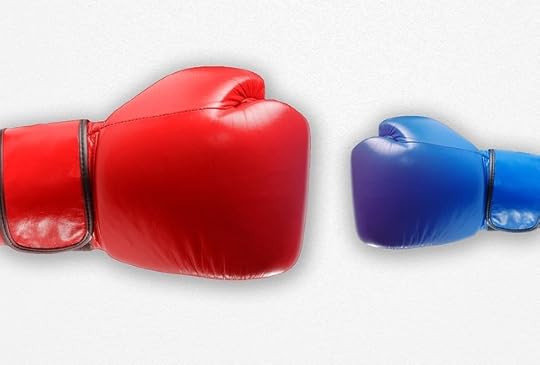

How to Win When Life is Unfair
Meldrick Taylor won the Gold Medal in boxing at the 1984 Olympics. Soon after, he took his 99-4 amateur record, turned professional, won the light welterweight title, and took his undefeated record into another title fight. It became the fight of the decade!
In 1990, the welterweight title fight occurred between the challenger, Meldrick Taylor, 24-0-1, and the champion, Julio Ceasar Chavez, 68-0.
Going into the last round, Meldrick Taylor, the underdog, had a lead over the champion, and Chavez needed a knockout to win. However, with 17 seconds left, Chavez tagged Taylor and actually knocked him down. Meldrick Taylor got up within five seconds, but with referee Richard Steele counting and only 2 seconds left…called the fight.
Jim Lampley announced, “This is the most unusual call by a referee in the history of the sport.”
If just two (2) more seconds were allowed to tick away, the fight would have gone to the scorecards, and Meldrick Taylor would have won a split decision.
Chavez was strengthened after the fight and he became the greatest Mexican fighter of all-time stretching his unbeaten record to 89-0-1 before losing a match.
Although Philadelphia native, Meldrick Taylor fought the fight of his life, he suffered for it. In the hospital after the fight, it was reported that he experienced a facial eye fracture, was urinating pure blood, and even suffered short-term memory loss.
The end result of the fight was that it was not fair, it was taken out of the hands of the fighters at that moment.
So, here’s how to win when life is unfair
1) Fairness does not mean entitlement-
I had so many publishers reject my first book, was that unfair?
Your good works will sometimes get overlooked. Other people may be picked or chosen or get the job you wanted. You may not be the one on stage or whose named is called for the award.
Are those instances unfair? Or are they just difficult outcomes to handle and accept?
I once gave away my soccer suite to some high profile entrepreneurs. Never got a thank you and when I asked for a favor several months later, it was crickets. Was that unfair, or just how it is sometimes?
Remember, when someone says “it is what it is,” that means something bad happened!
No one wants to admit that there are events and situations that are out of our control or that life is unfair. But, the fans on the losing side of any game are the ones who complain most about the refs. They play the blaming game and feel they are entitled.
Look at your situation and is it unfair, or is there a feeling of entitlement because you feel you deserve it?
When we lose, we need to be able to find what we learned from the situation and not automatically deem it unfair.
2) Luck is part of it-
Luck is preparation meeting opportunity.
Let’s face it, how to win when life is unfair means you have to get lucky. Now, no one wants to admit that luck is part of it. I get it. But, it doesn’t make it any less real.
What is crucial is the Importance of The Hinge and Mental Toughness. Every single one of us will have opportunities. What we do with that opportunity when it arrives is what connects who we are with who we become!
Since luck is part of the equation, then we need to connect with and develop relationships with as many people as possible, because we just don’t know who can be that Hinge for us!
We can’t isolate, because only mushrooms grow in the dark!
3) Respond don’t react-
It doesn’t matter how well you’ve prepared, things will go wrong!
It’s a matter of “when” NOT “if” adversity will strike. Proper preparation means that you’ll know how to win when life is unfair!
Luck, other people, people’s perception of us, other’s expectations, are all out of our control. We can influence others, but we do not control them.
How we respond to adversity, however, is 100% in our control. We are in our control of how we look at bad events, as either unfair and unjust, or actually as an opportunity.
When we are in the midst of the struggle, we need to respond, not react to adversity.
4) It’s not about the setback, it’s about the comeback-
Meldrick Taylor lost the fight of the decade and did suffer for it, but he also came back and WON the WBA Welterweight title and three successful defenses of that belt.
Amy Beth Acker writes that wanting life to be fair is a major block to peace. Acceptance is the key to all of life’s problems!
We are going to lose. But, when we do lose, we need to do this instead… Remember, it’s not about the setback, it’s about the comeback. It matters how we respond and bounce back after the defeats. That’s how to win when life is unfair!
5) Why?
Life is a mystery. I am clueless and baffled why natural disasters occur, why a two-year-old would develop cancer or sickle cell anemia, why a loved one develops an addiction or suffers, or how one begins to cope with losing a child. Most of life is filled with inconveniences, but these aforementioned are tragedies!
I believe that there is a God, and I know that I am not it. What I do know is that a tragedy, even though we don’t welcome it, actually becomes the strongest type of hinge.
Tragedies are an immediate hinge. However, the worse type of tragedies are not what takes place to us— but what we do to ourselves. We will make mistakes. We’ll make poor decisions. However, aside from mistakes, or bad decisions, every one of us has defects of character or weaknesses that we really don’t want. It matters how we respond to the adversity and setbacks in life.

Dr. Rob Bell is a Sport Psychology Coach. His company DRB & Associates is based in Indianapolis. Some clients have included: Indy Eleven, University of Notre Dame, Marriott, and Walgreens. Check out all the books.
Please check out the podcast 15 Minutes of Mental Toughness as we interview expert athletes and coaches about Mental Strength and their Hinge Moment.
October 5, 2018
5 Epic Mental Toughness Lessons From My Ironman
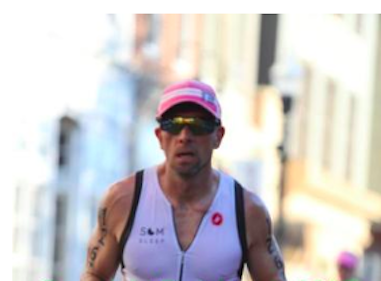
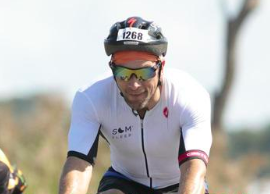
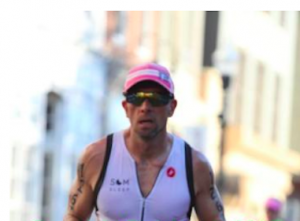
I recently spoke to James Lawrence, The Iron Cowboy on my podcast. He completed 50 Ironmans, in 50 days, in 50 states.
I did one.
.0007% of the world’s population complete an ironman every year. Walking down the street in the United States and you’ll meet 1 Ironman in every 1000 people. Guess it depends on your circle, because I’ll see four or five of them during every road workout.
The entire race took longer than it was for us to drive from the Eastern Shore back to Indianapolis.
Here’s the 5 Epic Mental Toughness Lessons I Learned from the Ironman.
Have a Why
If not now, when? If not you, then who? I couldn’t answer those questions!
When Rob, When?
I once wrote down one hundred things that I wanted to do before I died. A full Ironman was on there. But, that was not a deep enough present day why.
My major “why” had to do with others. My family, Josh Fugate, Izzy, and Tyler Trent. A friend from church, Todd Dolbeer passed away from pancreatic cancer days before the race and I thought about him as well.
Your why has to make you cry, if it doesn’t it’s not your why.
There simply will never be a perfect time for anything challenging and epic in our lives. We are all too busy! So, quit getting ready to get ready and just do it.
Face Your Fear and Do It Anyways
I started training on July 1st. I had 90 days to prepare for the race… My biggest fear was the bike. Not only did I have to borrow a bike again, but I needed to get serious training and miles!
So, I joined a Cycling team/group. The first group ride I joined was with about 12 other cyclists who all had the same jersey on and seemingly top of the line bikes.
It was like try-outs for a team of one. It was the first day of summer camp when you knew no one, except everyone knew each other. I had no jersey and didn’t know how to ride in groups. But, I faced the fear and did it anyway. I was an athlete, so it all came back to me. But, this cycle repeated itself several times with different cycling groups. I got a little better during every ride and closer to my goal and just like summer camp or a new team, eventually made friends.
Face the fear and do it anyways!
Click To Tweet
Face The Fear and Do It Anyways!
It wasn’t all sunshine and rainbows. I was taught some mental toughness lessons along the way. I got dropped from a ride twice and had a bad crash during one of my 100 mile rides, but always kept the goal in mind of the Ironman.
By the time of the Ironman race, I had logged over 1400 miles.
Enjoy The Journey
Everyday was a training day and I took the attitude that there was NO tomorrow. So, my goal was not only the miles and the workout and the challenge, but it was also a mental toughness lesson about focus.
I made it a point in training to focus on the moment and to focus only on this workout. This was my strategy to enjoy the journey. I got to ride all over Indiana and run crazy miles on the trail and see different places that I wouldn’t have without this race.
More importantly, I got to meet and train with different people and became friends with these individuals! They helped so much with various parts of preparation. People and relationships are all part of the journey and has nothing at all to do with the destination.
This skill of focusing on the moment translated directly into the Ironman race itself! I could only focus on just this mile! I didn’t become all-consumed with trying to finish. I was just focused on making it to the next aid station.
Stop and Help Others
We live in an overly-sensitive, easily-offended, anonymous hating, and self-congratulating, world.
Sometimes!
We can also live in a world where we are trying to create a better us and a better you!
It depends upon on attitude, outlook, and actions, which reality we create.
I wrote the book NO ONE Gets There ALONE because a stranger stopped his own race during a 1/2 Ironman to help me, an idiot! And that Hinge moment made all of the difference in my life.
I went into this ironman race with a lesson already qued up. It was “who are you going to help?” I had no idea who is was going to be of course, but it presented itself during the bike when a guy had a flat tire and I didn’t hesitate for a second.
I stopped!
I also was able to pray with a guy before the race even began while we were waiting to go to the swim corral. He had some serious anxiety and was a believer, so I shared with him my only go to! Pray and if that doesn’t work, pray again!
There’s Always A Second Wind
During the Ironman, the race really starts when it comes to the run. My first several miles were actually okay. But, like in life, things go bad and I started to have stomach cramps around mile 10. By mile 13, I wasn’t feeling good at all and started to get the chills and feel cold.
I saw this movie before at my previous races.
So, when I threw up on the course at mile 16, it was actually a relief. I felt better and was able to get moving. Except, I hadn’t eaten in a few hours and I didn’t want to eat, thus I had little energy.
Our second wind in life is always right around the next corner!
I got my second wind at mile 21-22. I was able to get a steady clip going and ran with another mate, named Greg Sinche, who suffered from a stroke at age 4. We ran the last few miles together and I finished the race like I was running a 5k.
I believe when we are at our best and others are doing the same, then it’s the easiest time to love on each other more.
My times?
swim time= 1:21
Bike Time = 6:33
Run time = 5:45
Total 13:58
Even after all the vomiting, I was able to get sub 14 hours, which was one of my goals.

Dr. Rob Bell is a Sport Psychology Coach. His company DRB & associates is based in Indianapolis. Some clients have included: Indy Eleven, University of Notre Dame, Marriott, and Walgreens. Check out all the books.
Please check out the podcast 15 Minutes of Mental Toughness as we interview expert athletes and coaches about Mental Strength and their Hinge Moment.
October 1, 2018
Three Simple Ways To Get Off The Struggle Bus


We ALL struggle! But, we all don’t have to ride the struggle bus.
No one wants to be on that bus, where we repeatedly keep messing up, quitting, not following through, or letting others down.
The struggle bus’s only destination is to the pity party, where no one shows up, but YOU!
Here are Three Simple Ways to Get Off The Struggle Bus
1) I immensely respect David Goggins. He’s an ultra-freak endurance athlete and the epitome of mental toughness. No matter what, he just keeps moving forward. He’ll run right off the struggle bus!
David Goggins was asked at a conference “how do you keep going through your extreme races?”
He answered “what-if.” He starts to ask “what if I can pull this off?” “what if I can keep going and overcome?”
What-if
I’ve always said “what-if” never happened. Too often we ask ourselves “what-if” and there isn’t an answer because we are focused on the past and NOT the future.
Most of the time when we ask “what-if”, we are trying to re-create our own past. And it’s fantasy.
Google “what-if never happened” and see what pops up. Hundreds of scenarios that simply didn’t happen and the possible outcomes from these hypothetical events. (i.e. what-if 9/11 didn’t happen? OR what-if we caught that touchdown?)
But Goggin’s strategy of “what-if” is focused on the future!!
James Altucher asks us to wake up asking the questions of “what-if.” He states- When you start with “What if?” you start with questions instead of answers.
2) Jesse Itzler, who actually had Goggins move in with him for a month (Read: Living With A Seal) has a similar strategy.
He tells himself “remember tomorrow!”
Remember tomorrow how you’ll feel if you give up and stop? Remember tomorrow if you don’t finish and push-through! Focusing on who we want to be will get us off the struggle bus!
Remember Tomorrow!
Both of these mantras are focused on the future and who we want to become!
3) One of my favorite lines from the Rocky Movies (and there are a ton) is from Rocky III. Apollo Creed is training Rocky in this movie and while Rocky is dealing with the typical battle against himself, Apollo drops some wicked knowledge on him.
There Is NO Tomorrow
So true, because if we approach every day like it is our last, then we leave nothing to chance and seize this day and this moment for all it is worth…Perhaps we need to start treating everyone else like it’s THEIR last day. If we can help other people get off the struggle bus, then we will get off of ours! NO ONE Gets There ALONE!
Repeat any of these mantras to yourself when struggling and need to get off of that bus!

Dr. Rob Bell is a Sport Psychology Coach. His company DRB & associates is based in Indianapolis. Some clients have included: Indy Eleven, University of Notre Dame, Marriott, and Walgreens. Check out all the books on Mental Toughness.
Please check out the podcast 15 Minutes of Mental Toughness as we interview expert athletes and coaches about Mental Toughness and their Hinge Moment.
Three Simple Ways To Get Off Of The Struggle Bus

We ALL struggle! But, we all don’t have to ride the struggle bus.
No one wants to be on the that bus, where we repeatedly keep messing up, quitting, not following through, or letting others down.
The struggle bus’s only destination is to the pity party, where no one shows up, but YOU!
Here’s Three Simple Ways to Get Off Of The Struggle Bus
1) I immensely respect David Goggins. He’s an ultra-freak endurance athlete and the epitome of mental toughness. No matter what, he just keeps moving forward. He’ll walk right past the struggle bus!
David Goggins was asked at a conference “how do you keep going through your extreme races?”
He answered “what-if.” He starts to ask “what-if I can pull this off?” “what-if I can keep going and overcome?”
What-if
I’ve always said “what-if” never happened. Too often we ask ourselves “what-if” and there isn’t an answer because we are focused on the past and NOT the future.
Most of the time when we ask “what-if”, we are trying to re-create our own past. And it’s fantasy.
Google “what-if never happened” and see what pops up. Hundreds of scenarios that simply didn’t happen and the possible outcomes from these hypothetical events. (i.e. what-if 9/11 didn’t happen? OR what-if we caught that touchdown?)
But Goggin’s strategy of “what-if” is focused on the future!!
James Altucher asks us to wake up asking the questions of “what-if.” He states- When you start with “What if?” you start with questions instead of answers.
2) Jesse Itzler, who actually had Goggins move in with him for a month (Read: Living With A Seal) has a similar strategy.
He tells himself “remember tomorrow!”
Remember tomorrow how you’ll feel if you give up and stop? Remember tomorrow if you don’t finish and push-through!
Remember Tomorrow!
Both of these mantras are focused on the future and who we want to become!
3) One of my favorite lines from the Rocky Movies (and there are a ton) is from Rocky III. Apollo Creed is training Rocky in this movie and while Rocky is dealing with the typical battle against himself, Apollo drops some wicked knowledge on him.
There Is NO Tomorrow
So true, because if we approach everyday like it is our last, then we leave nothing to chance and seize this day and this moment for all it is worth…
Repeat any of these mantras to yourself when struggling and need to get off of that bus!
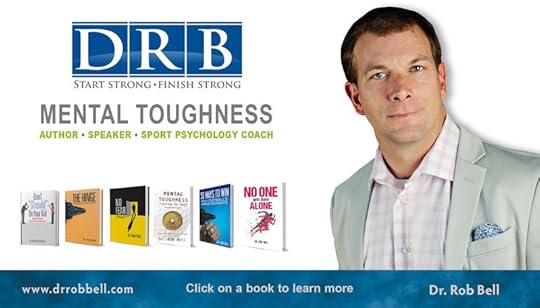 Drrobbell.com
Drrobbell.comDr. Rob Bell is a Sport Psychology Coach. His company DRB & associates is based in Indianapolis. Some clients have included: Indy Eleven, University of Notre Dame, Marriott, and Walgreens. Check out all the books on Mental Toughness. Please check out the podcast 15 Minutes of Mental Toughness as we interview expert athletes and coaches about Mental Toughness and their Hinge Moment.
September 28, 2018
Two Simple Ways To Get Off Of The Struggle Bus

 The Struggle Bus
The Struggle BusWe ALL struggle! But, we don't have to ride the struggle bus.
But, no one wants to be on the struggle bus, where we repeatedly keep messing up, quitting, not following through, or letting others down.
The struggle bus's only destination is to the pity party, where no one shows up, but YOU!
Here's Two Simple Ways to Get Off Of The Struggle Bus
I immensely respect David Goggins. He's an ultra-freak endurance athlete and the epitome of mental toughness. No matter what, he just keeps moving forward. He'll walk right past the struggle bus!
David Goggins was asked at a conference "how do you keep going through your extreme races?"
He answered "what-if." He starts to ask "what-if I can pull this off?" "what-if I can keep going and overcome?"
What-if
I've always said "what-if" never happened. Too often we ask ourselves "what-if" and there isn't an answer because we are focused on the past and NOT the future.
Most of the time when we ask "what-if", we are trying to re-create our own past. And it's fantasy.
Google "what-if never happened" and see what pops up. Hundreds of scenarios that simply didn't happen and the possible outcomes from these hypothetical events. (i.e. what-if 9/11 didn't happen? OR what-if we caught that touchdown?)
But Goggin's strategy of "what-if" is focused on the future!!
James Altucher asks us to wake up asking the questions of "what-if." He states- When you start with “What if?” you start with questions instead of answers.
Jesse Itzler, who actually had Goggins move in with him for a month (Read: Living With A Seal) has a similar strategy.
He tells himself "remember tomorrow!"
Remember tomorrow how you'll feel if you give up and stop? Remember tomorrow if you don't finish and push-through!
Remember Tomorrow!
Both of these mantras are focused on the future and who we want to become!
 Drrobbell.com
Drrobbell.comDr. Rob Bell is a Sport Psychology Coach. His company DRB & associates is based in Indianapolis. Some clients have included: Indy Eleven, University of Notre Dame, Marriott, and Walgreens. Check out all the books on Mental Toughness. Please check out the podcast 15 Minutes of Mental Toughness as we interview expert athletes and coaches about Mental Toughness and their Hinge Moment.
Powered by Story Chief
September 21, 2018
Avoid This Costly Mistake That Every Sport Parent Makes

No matter the sport, navigating the jungle of youth sports is hard.
The questions are similar for everyone:
What type of coaching?
Kind of league?
Travel or no travel?
How many tournaments or showcases?
Is it wise to specialize?
Level of overall commitment?
Are we doing enough as parents or too much?
All healthy and valid questions to ask. But, if you are in the midst of youth sports and contributing to the 15 billion dollar business, then you may want to avoid this costly mistake that every sport parent makes.
The financial impact upon family resources is indeed a factor of having your own child participate at a high level of sports.
Not all sports are created equal. You are probably already feeling the costs of participating. Depending on where you live, what sport your child plays, and what summer camps they attend, you may pay upwards of $4,000 to $10,000 each year, maybe more, per sport. These don’t include travel costs incurred to attend tournaments and showcases.
To avoid this costly mistake that every sport parent makes is about the MONEY ISSUE.
Most parents ask, or unintentionally state:
“We are paying how much for lessons, and you play this way?”
“We’ve invested too much time to have you quit.”
“This has to pay off.”
“Boy, we sure have been doing this a long time.”
“You’ll take care of your momma one day.”
Research on scholarships of Division I athletes shows that the behavior of a coach is most important for motivation. Motivation increased or decreased on how the scholarship was communicated to them. If a coach communicated the scholarship as informational (you’re good enough), then motivation increased. However, if a coach used the scholarship as controlling (you’ll do this because you’re on scholarship), motivation decreased.
With our youth athlete, the perception of money and time is what is crucial. If it is seen as a tool of information, it will increase motivation. If it is viewed as controlling, then motivation will be crushed.
As a parent, the role is to be supportive, not controlling. We need to avoid this costly mistake that every sport parent makes.
When the issue of finances come up and we accidentally utter one of the phrases above or talk with our kid about what something costs, it mistakenly adds undue stress.
Check out our infographic on 5 ways to crush a kids confidence.
When money or time or the amount of sacrifice that YOU have made is brought up, it adds pressure.
Pressure can burst a pipe. Youth athletes then start to play NOT to lose, they play safe, and as a result, they don’t play to their capabilities! This causes more anxiety and stress and sucks the fun and their talent out the door.
Check out the book Don’t “Should” on Your Kids: Build Their Mental Toughness
Students and athletes today are in the know; they are aware of cost and sacrifices. Due to the sacrifices made by parents, they often internalize their play and struggle as letting others down. They don’t want to disappoint you as a parent.
Discussing money, time, and financial independence are sometimes essential. But, there is a place to discuss money and time.
Discuss all pressure and uncomfortable topics in non-pressure and comfortable environments.
Click To Tweet
Discuss all pressure and uncomfortable topics in non-pressure and comfortable environments.
Communicating and planning from both ends are best discussed before and after every season, certainly not during the season or after bad outcomes.
We need to use the money issue as the reason why we support them, that we believe in them, and are thankful to be able to provide for them and watch them play. This is a point that needs to be communicated often especially in our everyday life and they way we approach money situations.

Dr. Rob Bell is a Sport Psychology Coach. His company DRB & associates is based in Indianapolis. Some clients have included: Indy Eleven, University of Notre Dame, Marriott, and Walgreens. Check out all the books on Mental Toughness. Please check out the podcast 15 Minutes of Mental Toughness as we interview expert athletes and coaches about Mental Toughness and their Hinge Moment.



